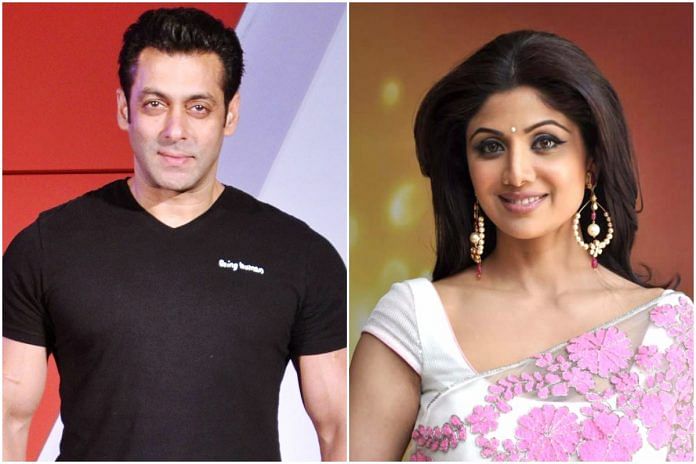Unless you are adamant on taking your 2017 casteism into 2018, maybe now would be a good time to stop saying the word Bhangi.
Here we are again, at almost the tip of this rat-tail of a year, explaining why it matters when a public figure uses ‘Bhangi’ to describe a person for looking or performing their worst.
Recently, old videos of actors Salman Khan and Shilpa Shetty resurfaced, where they casually talk about how a certain awkward dance step or a less than presentable appearance made them look ‘Bhangi’. Now, you might say, they didn’t exactly ridicule Bhangis or say that there was anything wrong with being one. In fact, they said they looked like one.
So what’s the issue? Except, you’d be wrong.
Language and the words we use to describe things almost always represent the ideas of a society. And it’s no secret, that as a society, we are pretty darn casteist. We ridicule Dalit men for growing mustaches, kill a ‘lower’ caste person for marrying someone from a ‘higher’ caste and keep our ‘lower’ caste house workers out of our kitchens because ‘who knows where their hands have been’. So when Khan and Shetty describe looking Bhangi when they are at their worst, they are essentially opening a wormhole to the disgust our societies reserve for ‘lower’ castes, especially Bhangis. Because don’t we already assume that all Bhangis look exactly like Shilpa Shetty’s worst and Salman Khan’s most clumsy.
All of us, whether we are Bollywood superstars, popular comics like Mallika Dua who are often on the right side of justice or my fifth grade friend from school, are somehow convinced that ‘upper’ caste version of despicable is the normal reality of Bhangis.
The ‘upper’ castes often believe that being Bhangi must mean being filthy, untalented, unskilled, and generally the most repugnant version of themselves. That’s why it’s their go-to abuse for anyone who fits that description.
Except when you use that abuse, you are not referring to a fictitious buffoon or a random jerk. Instead, you are talking directly about a particular type of person born in that caste. That person who might be Bhai’s biggest fan, someone who until watching her drop the ‘B-bomb’ felt deeply empowered by Dua’s comedy, or a 10-year-old refusing to lift her head from the water fountain till her classmates calling each other Bhangi for their dirty uniforms, finally leave.
The ones, whose dirty ‘lower’ caste more or less defines their lives in this country, often know that this abuse wasn’t specifically about them. But they also know that no matter how clean their houses or crisp their uniforms, they are still living examples of filth, inability and squalor, as far as our casteist culture is concerned.
When they say they look Bhangi when they are less than attractive, they mean they look as bad a Bhangi does every day. Because for them, and the rest of the society, there is no other way for Bhangis to look, appear, or behave.
The idea that we are somehow less than capable because we are Bhangi doesn’t just sting for a minute when a popular face says it. It follows us to our classrooms, our workplaces, our job searches and house hunting, and even our personal relationships. The more ‘upper’ castes compare their worst to a Bhangi reality, the more reasonable it seems, until over time it just becomes an accepted truth.
The kind of truth that make actual Bhangis believe that they just might be the worst version of ‘upper’ caste people. That they are somehow less capable, less worthy, and less equal. It becomes the type of fact that feels like liquid acid in your ears when someone mentions how they look like a Bhangi because they hadn’t showered for a week. The cultural reality that makes you scared of saying it out loud because you don’t want the bitter disgust with which the ‘upper’ castes use the word to smear all over you. Your identity becomes a catch-all for the worst standard in a society, and by extension so do you.
Words matter, so do their meanings. You probably know you can’t say the N-word to describe Black people or the F-word for the LGBTQ community (if you don’t, educate yourself maybe?) Using Bhangi to describe your shortcomings and inabilities is just as bad, and for similar reasons. Unless you are adamant on taking your 2017 casteism into 2018, maybe now would be a good time to stop saying it.
Yashica Dutt is a New York based writer and journalist who is about to publish a definitive non-fiction book on growing up ‘lower’ caste in India. She has worked as a Principal Correspondent for Hindustan Times and is the founder of Documents of Dalit Discrimination Tumblr.




I can so much co relate my self with your article !! Its a sin being a schedule caste in India, and that always had been !! Doesn’t matter in which profession you are but people will mock you by your caste , even my maid(a brahman) had these words “mai chamaro ko hath nahi lagati while reffering to her neighbor” !! My colleagues saying to one of my SC friend “abe gadi(car) dekhi bhi hai tune” so much of exploitation every other person is intrested in knowing your caste. Hum bhraman,hum pandit,hum rajput,hum blah blah tum kon ? I face these types of things very often !!